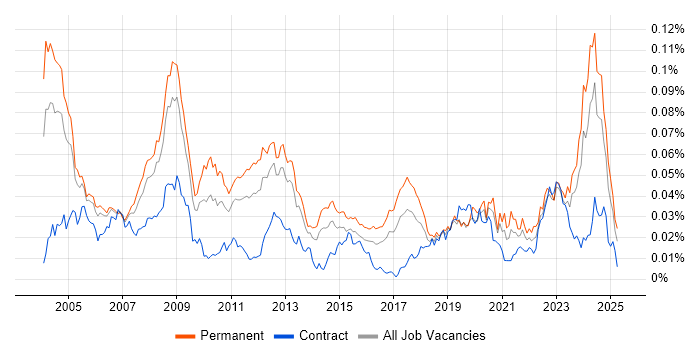Fortran
UK
The table below provides summary statistics and salary benchmarking for jobs requiring Fortran skills. It covers permanent job vacancies from the 6 months leading up to 5 February 2026, with comparisons to the same periods in the previous two years.
| 6 months to 5 Feb 2026 |
Same period 2025 | Same period 2024 | |
|---|---|---|---|
| Rank | 663 | 650 | 724 |
| Rank change year-on-year | -13 | +74 | +240 |
| Permanent jobs citing Fortran | 5 | 50 | 67 |
| As % of all permanent jobs in the UK | 0.008% | 0.098% | 0.092% |
| As % of the Programming Languages category | 0.041% | 0.29% | 0.24% |
| Number of salaries quoted | 5 | 26 | 58 |
| 10th Percentile | - | £37,185 | - |
| 25th Percentile | £40,015 | £40,000 | £41,250 |
| Median annual salary (50th Percentile) | £56,430 | £52,147 | £58,750 |
| Median % change year-on-year | +8.21% | -11.24% | +35.84% |
| 75th Percentile | £60,715 | £73,750 | £73,750 |
| 90th Percentile | £70,486 | £77,500 | - |
| UK excluding London median annual salary | £56,430 | £54,254 | £54,130 |
| % change year-on-year | +4.01% | +0.23% | +25.16% |
All Programming Languages
UK
Fortran falls under the Programming Languages category. For comparison with the information above, the following table provides summary statistics for all permanent job vacancies requiring coding skills.
| Permanent vacancies with a requirement for coding skills | 12,191 | 17,354 | 27,405 |
| As % of all permanent jobs advertised in the UK | 18.83% | 33.95% | 37.59% |
| Number of salaries quoted | 8,809 | 10,204 | 22,597 |
| 10th Percentile | £33,350 | £37,574 | £36,250 |
| 25th Percentile | £46,250 | £48,750 | £45,000 |
| Median annual salary (50th Percentile) | £62,500 | £65,000 | £60,000 |
| Median % change year-on-year | -3.85% | +8.33% | -7.69% |
| 75th Percentile | £82,500 | £85,000 | £80,000 |
| 90th Percentile | £100,000 | £110,000 | £100,000 |
| UK excluding London median annual salary | £55,000 | £56,000 | £55,000 |
| % change year-on-year | -1.79% | +1.82% | - |
Fortran
Job Vacancy Trend
Historical trend showing the proportion of permanent IT job postings citing Fortran relative to all permanent IT jobs advertised.

Fortran
Salary Trend
Salary distribution trend for jobs in the UK citing Fortran.

Fortran
Salary Histogram
Salary distribution for jobs citing Fortran over the 6 months to 5 February 2026.
Fortran
Top 5 Job Locations
The table below looks at the demand and provides a guide to the median salaries quoted in IT jobs citing Fortran within the UK over the 6 months to 5 February 2026. The 'Rank Change' column provides an indication of the change in demand within each location based on the same 6 month period last year.
| Location | Rank Change on Same Period Last Year |
Matching Permanent IT Job Ads |
Median Salary Past 6 Months |
Median Salary % Change on Same Period Last Year |
Live Jobs |
|---|---|---|---|---|---|
| Work from Home | +36 | 5 | £56,430 | +34.36% | 3 |
| England | +21 | 5 | £56,430 | +8.52% | 3 |
| UK excluding London | -12 | 5 | £56,430 | +4.01% | 3 |
| South East | -15 | 4 | £49,220 | -5.35% | |
| East of England | - | 1 | £72,500 | - |
Fortran
Co-Occurring Skills & Capabilities by Category
The following tables expand on the one above by listing co-occurrences grouped by category. They cover the same employment type, locality and period, with up to 20 co-occurrences shown in each category:
